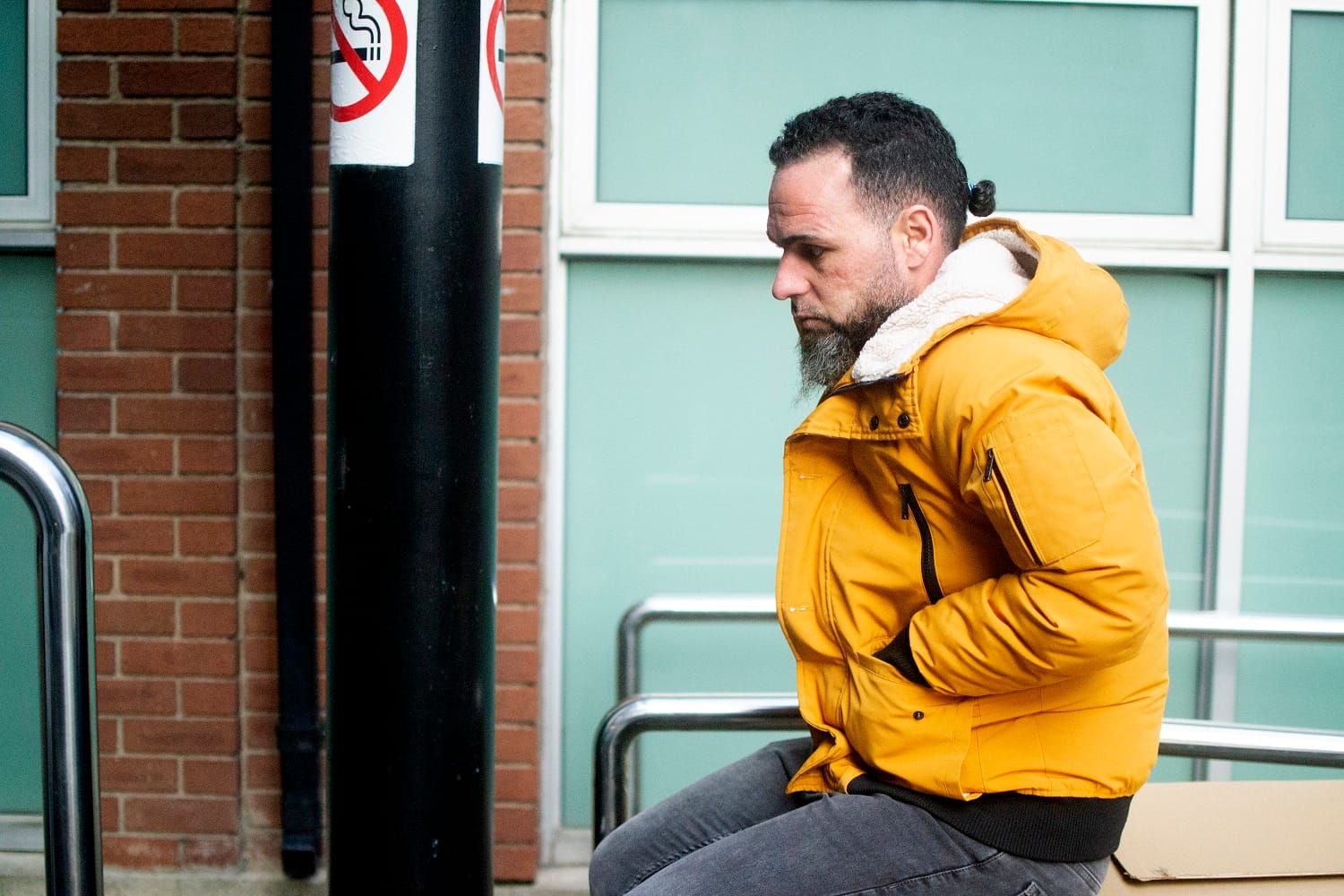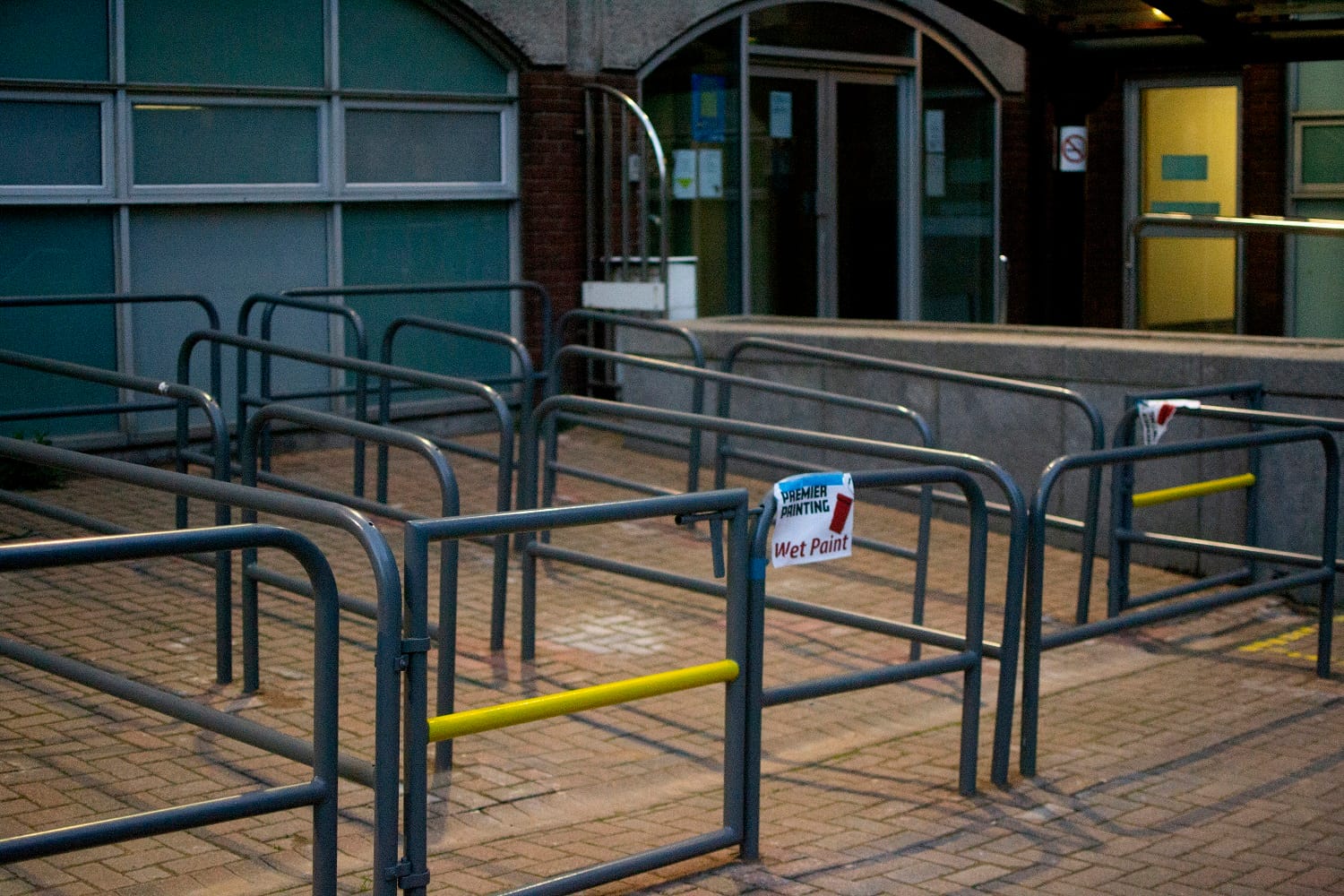What’s the best way to tell area residents about plans for a new asylum shelter nearby?
The government should tell communities directly about plans for new asylum shelters, some activists and politicians say.
In an unfamiliar city, it seemed like a place Aysar Hamad could find protection. The Department of Justice says he was blocking the entrance.

Aysar Hamad poked his head out of his silver tent and drew from a cigarette.
Beside the entrance to his makeshift shelter was a take-away cup. On top of the tent, a cardboard sign read: “A Palestinian asylum seeker who escaped death – He has no place of residence in Ireland.”
Aysar’s brother, Ayman, sat in front of the tent, on a concrete platform in front of one of the entrances to the International Protection Office (IPO) near Merrion Square. His hands were shoved into the pockets of his orange coat, his gaze lowered.
It was Tuesday 7 March, and Aysar had been homeless for three days short of a month, despite his brother’s efforts to get permission for him to share his room in a direct provision centre.
Ayman was worried, he said. He feared his brother, who can’t communicate in English yet, would be attacked if he set up his tent on the streets.
“He’s safe here,” he said, pointing to a glass canopy over Aysar’s tent in front of the International Protection Office.
Ayman didn’t believe that setting up there was illegal, he said, although IPO staff had told him it was.
“I told them, ‘If it’s illegal, call the police,’” he said, looking at the IPO entrance.
On Wednesday 8 March, staff at the IPO did call the guards. Aysar was moved on. Ayman said Gardaí briefly detained them.
When the guards let them go, the brothers asked for the tent. “According to what they said they destroyed it,” said Ayman in a WhatsApp message last Wednesday.
A spokesperson for An Garda Síochána said its officers had arrested two men on Mount Street Lower – where the IPO offices are – on 8 March “for alleged offences contrary to the Criminal Justice (Public Order) Act 1984”.
“Both males were released pending a formal Adult Caution,” they said.
They didn’t say whether Aysar’s tent was destroyed or, if so, why. “An Garda Síochána does not comment on remarks made by 3rd parties,” they said.
Anyone who feels they have been mistreated by an officer can file a complaint with the Garda Síochána Ombudsman Commission, they said.
A spokesperson for the Department of Justice said that IPO workers are “very attuned and sympathetic to the situation of their applicants”.
The tent was blocking access to a very busy public office, they said, and since Aysar didn’t move his tent when asked, IPO staff contacted the Gardaí.
“A procedure has since been put in place to mitigate any future occurrence,” they said.
The spokesperson didn’t elaborate on the procedure. “The Department does not comment on internal operational procedures,” they said.
On the evening of 8 March – the day their tent was torn down – the brothers slept at a friend’s house, planning to buy a new tent and pitching up outside the Dáil this time, said Ayman in a WhatsApp message that night.
But on 9 March, Aysar finally got an email from the International Protection Accommodation Services (IPAS), saying he could share his brother’s room in a direct provision centre near Dublin Airport.
By then, Aysar – who arrived in Ireland on 10 February – had been homeless for a month.
Aysar had €200 when he arrived, but that quickly dwindled to €20, spent on hostel beds, said Ayman. Some nights, Ayman’s friends let his brother sleep on their couches, he said.
They had repeatedly asked IPAS – an office at the Department of Children and Equality in charge of housing asylum seekers – for permission to do that, said Ayman. They had turned to refugee support non-profits for help, too, he said.
“It was a tiring month,” said Ayman on Friday.

“I have a brother who lives near the airport in a room in direct provision,” says an email sent by Aysar from his brother’s email account to IPAS on 13 February. His brother has no problem sharing with him, he wrote.
“Please, I am tired and my country is occupied and I have suffered a lot from the Israeli occupation of my country,” says the email.
The first he heard back was on 9 March, he says, when a response signed off by “IPAS Helpdesk” said that he could live with his brother, but had to cover his own transport fees because he was joining family, referring to the placement as “family reunification”.
“IPAS does not provide transport for family reunification,” says the email.
In immigration law, family reunification refers to the process of applying to bring family over from overseas, not moving in with them in Ireland.
A spokesperson for the Department of Children and Equality didn’t respond to any queries about Aysar’s specific circumstances.
Coming to the negative attention of the Gardaí can impact immigration statuses, with immigrants needing to be deemed of “good character” to be allowed to stay here, work as taxi-drivers say, and to become Irish citizens.
A spokesperson for the Department of Justice spoke generally about how asylum applications are processed rather than specifically about Aysar’s case.
“The Department does not comment on individual cases,” the spokesperson said.
The IPO focuses on why someone has fled their place of birth and can’t go back, the spokesperson said.
“All applications for international protection are processed fairly and impartially,” they said. Incidents such as this are not relevant to the application, they said.
More than 20,000 asylum seekers are currently housed in accommodation through the IPAS office, said a spokesperson for the Department of Children and Equality on 9 March.
“Compared with 8,300 at this time last year,” they said.
Since the government paused entry to its Citywest transit hub on 24 January, 217 asylum seekers remain unaccommodated by IPAS, they said.
So far, IPAS has housed 321 asylum seekers who were turned away at first, and it is currently offering accommodation to people who arrived on 13 February, they said.
But asylum seekers were left without accommodation even before IPAS closed the doors at Citywest.
A “situation report” from last July by the Department of Children and Equality mentions asylum seekers without accommodation, including those left homeless at the IPO, like Aysar later was.
On the night of 15 July 2022, there were 29 people at the IPO waiting for shelter, says one report, released under the Freedom of Information (FOI) Act.

“The availability of accommodation for International Protection applicants remains a very significant challenge,” said a spokesperson for the Department of Children and Equality.
They said the department is working with local authorities, NGOs and others to open new accommodations. It’s using office buildings, decommissioned military barracks, and tents to make do for now, the spokesperson said.
In their January situation reports, the Department of Children and Equality officials mention how anti-immigrant protests have impacted the availability of beds for single men.
“Due to protests in [redacted] and [redacted], allocation of single male accommodation will be impacted due to necessity for community engagement to be enhanced,” says a report for 9 January.
“Some people (single males) are on chairs in [Citywest Transit Hub] since mid-November,” says the situation report for 10 January.
The government is putting up rapid-build homes, but that’s only for Ukrainian refugees, at least for now, according to an update from the Department of the Taoiseach.
Rapid builds could also later be used to address other accommodation challenges, says the government update. “Including social housing and student accommodation.”
Ayman, Aysar’s brother, said he still wants people to know what happened even now that his brother has a bed. He shouldn’t have been left homeless for so long when space was available, he says.
“I even had to use the tent and they didn’t respond to me,” said Ayman on Friday.
Get our latest headlines in one of them, and recommendations for things to do in Dublin in the other.